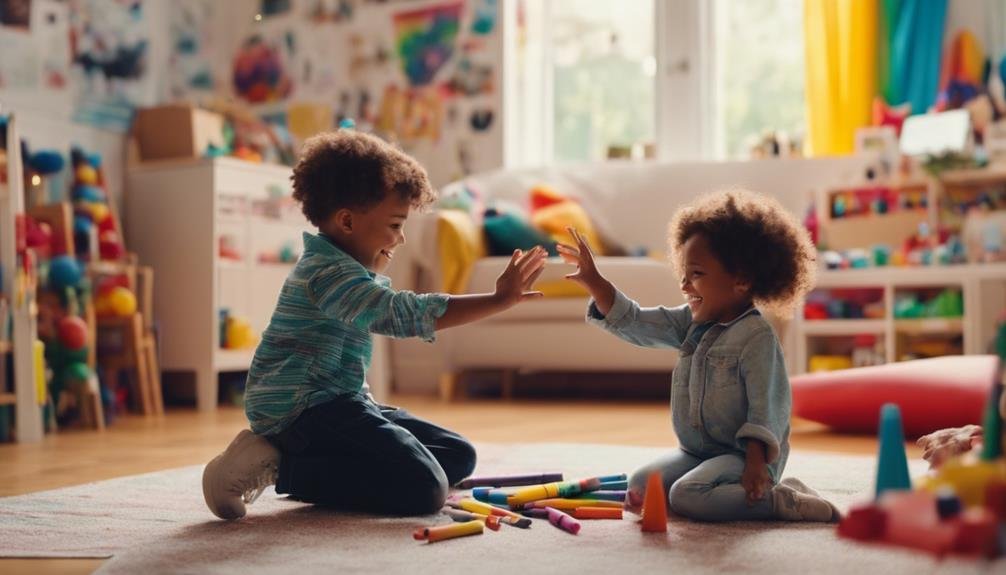"Cherishing Little Steps - A Haven for Baby and Family Journeys"
Navigating Toddlerhood: Essential Tips for First-Time Parents
As a first-time parent, you may have experienced the frustration of trying to understand your toddler's behavior. Why do they have meltdowns at the supermarket but are perfectly fine at the park? What can you do to handle their tantrums effectively without feeling overwhelmed? By learning to decode your child's actions, you can start to navigate toddlerhood with more confidence and less stress. Understanding the reasons behind their behavior is key to fostering a strong parent-child bond and promoting healthy development.
Key Takeaways
- Establish clear boundaries to set expectations and provide security.
- Use effective communication strategies to foster understanding and connection.
- Implement positive reinforcement techniques to encourage good behavior.
- Create consistent routines for stability and predictability in daily life.
- Encourage independence to boost self-esteem and teach valuable life skills.
Setting Clear Boundaries

When setting clear boundaries as first-time parents, it's essential to communicate openly and consistently with your child. Establishing boundaries helps your child understand expectations and fosters a sense of security. Children thrive when they know what's expected of them, so setting clear limits can actually be a form of love and guidance.
Consistency is key when it comes to boundaries. Children learn best when rules are consistently enforced. This doesn't mean being rigid or inflexible, but rather showing your child that boundaries are important and will be upheld. Consistent boundaries create a sense of predictability that can help children feel safe and secure.
Effective Communication Strategies
To improve communication with your child, consider utilizing active listening techniques to show understanding and empathy. When your toddler speaks to you, make eye contact, nod, and provide verbal cues to show you're paying attention. Reflect back what they're saying to ensure you understand their feelings and thoughts. By actively listening, you create a safe space for your child to express themselves.
Another effective communication strategy is to keep your language simple and clear. Use short sentences and speak at your child's level to ensure they understand you. Avoid using complex words or long explanations that may confuse them. Additionally, try to maintain a calm and patient tone when communicating, even in challenging situations. Your child will respond better to a gentle approach.
Lastly, encourage two-way communication by asking open-ended questions and giving your child time to respond. This shows them that their thoughts and feelings are valued. By implementing these communication strategies, you can foster a strong bond with your child and navigate toddlerhood with greater ease.
Positive Reinforcement Techniques

Improve your child's behavior and reinforce positive actions through effective use of reinforcement techniques. Positive reinforcement involves acknowledging and rewarding desired behaviors to encourage their repetition. By praising good behavior, you can help your child understand what is expected of them and motivate them to continue acting in that manner. Here are a few practical positive reinforcement techniques to consider:
| Technique | Description |
|---|---|
| Praise and Encouragement | Acknowledge and praise your child when they exhibit positive behavior. Encouragement boosts their confidence. |
| Reward System | Create a reward system where your child earns a small prize for consistently demonstrating good behavior. This can be a sticker chart or a token system. |
| Quality Time Together | Spending quality time with your child can be a powerful form of positive reinforcement. Engaging in activities they enjoy strengthens your bond and reinforces positive behavior. |
Implementing these positive reinforcement techniques can help foster a positive and nurturing environment for your child to thrive.
Establishing Consistent Routines
Establishing consistent routines is crucial for creating stability and predictability in your child's daily life. Toddlers thrive on routine as it provides a sense of security and helps them understand what to expect next. Start by establishing a consistent schedule for meals, naps, playtime, and bedtime. This predictability can help your child feel more secure and reduce tantrums or meltdowns.
When setting up routines, be flexible and willing to make adjustments as needed. Remember, every child is different, so what works for one may not work for another. Keep in mind that routines can evolve as your child grows and their needs change.
Consistency is key when establishing routines. Try to stick to the same sequence of events each day so your child knows what to anticipate. Consistent routines can also make transitions smoother and help your child feel more in control of their environment.
Encouraging Independence

As your child grows and explores the world around them, it's important to foster their independence in ways that support their development and confidence.
Encouraging independence in your toddler can be a rewarding yet challenging journey. One way to do this is by allowing them to make simple choices. Offer them options like picking out their clothes or choosing a snack, empowering them to feel in control.
Another way to promote independence is by encouraging them to help with small tasks around the house. This could include putting away toys, setting the table, or even assisting with simple meal prep. Not only does this teach valuable life skills, but it also boosts their self-esteem and sense of accomplishment.
Additionally, providing opportunities for your child to take safe risks and explore their surroundings under your supervision can help build their confidence and resilience.
Nurturing Emotional Development
How can you support your child's emotional development as a first-time parent? Nurturing your toddler's emotional growth is crucial for their overall well-being. By creating a safe and loving environment, you can help them navigate their feelings and develop essential emotional skills. Here are some practical tips to assist you along the way:
| Tip | Description | Example |
|---|---|---|
| Encourage expression | Encourage your child to express their emotions through words, art, or play. | "How are you feeling today? Can you draw it?" |
| Validate feelings | Acknowledge and validate your child's emotions, showing them it's okay to feel. | "I understand you're upset. It's okay to cry." |
| Teach coping strategies | Help your toddler learn healthy ways to cope with emotions like deep breathing. | "Let's take deep breaths when you feel angry." |
| Lead by example | Model positive emotional behavior and effective problem-solving for your child. | "I'm feeling frustrated too, let's figure it out." |
Frequently Asked Questions
How Can I Handle My Toddler's Picky Eating Habits?
Handling your toddler's picky eating habits can be challenging. Encourage a variety of foods, involve them in meal prep, offer choices within limits, and stay patient. Remember, it's a phase, and modeling healthy eating habits can make a difference.
What Are Some Ways to Manage Toddler Tantrums in Public?
When your toddler throws a tantrum in public, try staying calm, offering comfort, and setting boundaries. Redirect their attention, acknowledge their feelings, and consider leaving if needed. Consistency is key in managing public tantrums.
Is It Normal for My Toddler to Have Imaginary Friends?
Having imaginary friends is a common part of toddler development, sparking creativity and social skills. It's normal for your little one to engage in imaginative play. Embrace this phase, as it fosters cognitive growth and emotional expression.
How Can I Encourage My Toddler to Share With Others?
To encourage your toddler to share with others, model sharing behaviors, praise their efforts, use positive reinforcement, provide opportunities for sharing, and teach empathy. Remember, patience is key in guiding your little one through this important developmental milestone.
What Should I Do if My Toddler Is Showing Signs of Aggression?
When your toddler shows signs of aggression, address the behavior calmly but firmly. Use positive reinforcement for good behavior and teach them appropriate ways to express emotions. Remember, you can catch more flies with honey than with vinegar.
Conclusion
In the wild world of toddlerhood, remember: setting boundaries, communicating effectively, and staying positive are key.
Consistent routines and encouragement of independence will help your little one thrive.
And don't forget to nurture their emotional development along the way.
With patience and love, you've got this!
So, take a deep breath, embrace the chaos, and enjoy the journey of parenting your amazing toddler.




